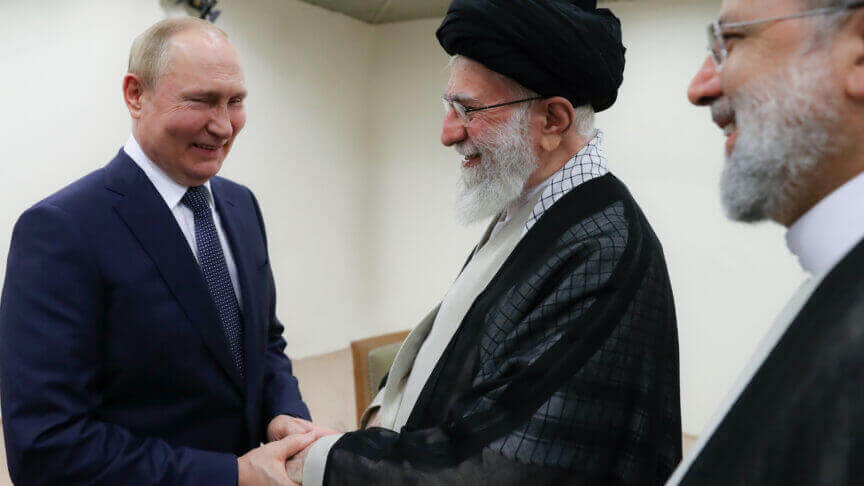Russia is supplying Iran with cyber weapons capable of advanced digital surveillance, the Wall Street Journal (WSJ) reported on Monday.
The report states that Tehran is keen on expanding cyber warfare cooperation with Moscow. It also posits that the Kremlin has deepened its military commitment to Iran after the latter supplied drones that the Russian military has used to carry out strikes in Ukraine.
Cyber Warfare Collaboration
According to the report, two years ago, Russia and Iran signed a cyber-cooperation agreement focused on cyber defence networks. It noted that the deal was signed despite Russia having long-standing doubts regarding sharing digital capabilities with Iran, fearing they would be sold on the dark web.
Russia plans to supply Iran with advanced technology, including software aimed at spying on dissidents’ phones, internet censorship, lie detectors, and surveillance cameras. Iranian and US sources told the WSJ that Tehran also requested dozens of Russian attack helicopters, fighter jets, and aid for its long-range missile programme.
The report stressed that this development is concerning as the Iranian regime has already used the internet to slow down web traffic and stop the spread of videos and systems of communications that protestors could use. The regime also used surveillance tools that helped track protestors from different areas.
According to the news outlet, Russia provided Iran’s cyber warfare programme with a more sophisticated way of monitoring communications inside the country. Annie Fixler, a cyber policy analyst, told WSJ that “given Russia’s superior capabilities, any amount of knowledge transfer would improve Iran’s cyber capabilities.”
The report also quotes a document published by the University of Toronto, which found that Russia provided internet-censorship software called PROTEI to Iranian mobile service Ariantel. The Kremlin is believed to have used PROTEI to monitor phone lines, emails, and card transactions.
Iran-Russia Defence Partnership
Russia and Iran bolstered their strategic alliance during the Syrian civil war, in which they helped Syrian President Bashar Al Assad suppress anti-regime rebels. Russia has also deployed Iranian drones in Ukraine, further deepening their military relations.
Ties expanded during the Russia-Ukraine war, which began in last February, with Iran supplying unmanned aerial vehicles and missiles to Russia, including Shahed-6 suicide drones, which have proved to be effective in damaging “critical infrastructure” in Ukraine.
Last year, the two countries also finalised a deal to help Iran manufacture drones on Russian soil. Tehran agreed to the deal to avoid new sanctions by assisting Moscow in manufacturing drones within its boundaries. Russian military aircraft have reportedly transported $140 million in cash to Iran in exchange for the supply of drones.
According to US sources, Iranian trainers have been deployed in Crimea to “assist Russian forces” in conducting drone strikes and providing technical support.
Russia is helping Iran gain advanced digital surveillance capabilities, widening Russia-Iran military cooperation.
— Anton Gerashchenko (@Gerashchenko_en) March 28, 2023
Russia reportedly provided Iran with eavesdropping devices, advanced photography devices, and lie detectors - WSJ.
https://t.co/n5Vt0MQCTU
Western Sanctions and Concerns
Tehran-Moscow ties have further strengthened in recent years as both countries are facing sanctions imposed by the West.
In 2020, the US reimposed UN sanctions on Iran, which were lifted as part of the Iran nuclear deal in 2015. In September 2022, the US imposed three additional sanctions on Iran for providing drones to Russia and for cyber-attacks on the US and its allies. Earlier this month, the US sanctioned 39 companies for providing “Iranian oil firms” access to the international financial system.
The sanctions prompted Tehran to deepen relations with Moscow. Russia shares a similar ideology with Iran, which believes in a multi-polar world order wherein the US has a limited role.
The US has also imposed sanctions on 278 members of the Russian Parliament for “enabling a referendum” to annex regions in Ukraine. Organisations outside Russia have also been targeted for providing military and financial support to the country. Additionally, there was an “import ban on Russian gold” and all Russian flights were banned from the US, the UK, and Canada’s airspace. Meanwhile, the EU has banned oil imports from Russia.
The foreign ministers of the US, UK, France and Germany have expressed concerns regarding the “two-way military” cooperation between Moscow and Tehran threatening the stability of neighbouring regions.
Western allies have condemned Tehran’s acts and stated that supplying arms and ammunition to Russia for use against Ukraine is against the 2015 nuclear deal. Accordingly, three permanent members of the UN Security Council (UNSC) — the UK, France, and the US — have urged the UN to conduct a probe against Iran for breaching UNSC resolution 2231.

